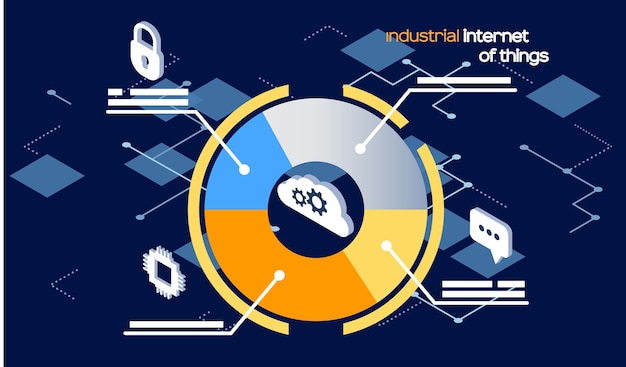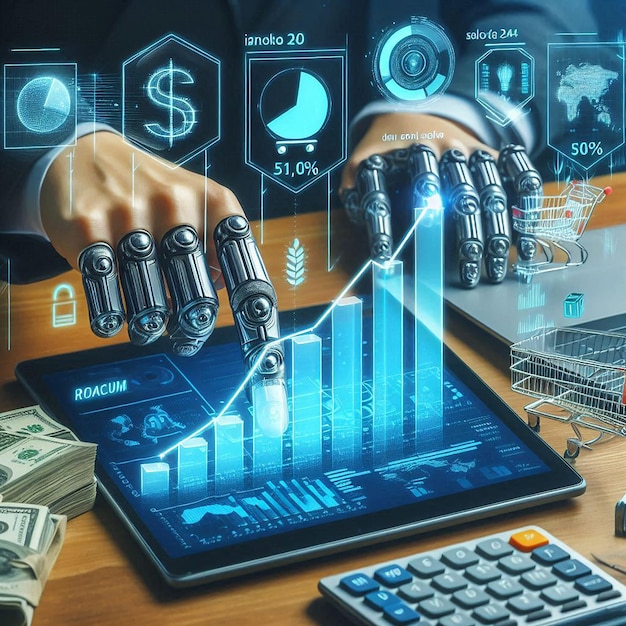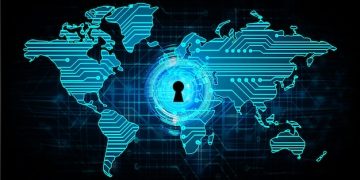AI Cybersecurity: Protecting US Businesses from Evolving Threats

The rise of AI-powered cybersecurity is revolutionizing how US businesses protect themselves from increasingly sophisticated cyber threats, offering proactive and adaptive defenses.
In today’s digital landscape, the rise of AI-powered cybersecurity is no longer a futuristic concept but a crucial necessity for US businesses facing evolving and sophisticated cyber threats.
Understanding the Evolving Cybersecurity Threat Landscape
The cybersecurity threat landscape is constantly evolving, with cybercriminals employing increasingly sophisticated techniques to target US businesses. Understanding these threats is the first step in implementing effective cybersecurity measures.
The Growing Sophistication of Cyber Threats
Cyber threats are becoming more sophisticated every day, with attackers using advanced techniques to bypass traditional security measures. Phishing attacks, ransomware, and malware are becoming more targeted and personalized, making them harder to detect.
The Impact of Cyberattacks on US Businesses
Cyberattacks can have a devastating impact on US businesses, leading to financial losses, reputational damage, and legal liabilities. Small and medium-sized businesses (SMBs) are particularly vulnerable, as they often lack the resources and expertise to implement robust cybersecurity measures.
- Financial losses due to theft of funds, business disruption, and recovery costs.
- Reputational damage leading to loss of customer trust and business opportunities.
- Legal liabilities due to data breaches and non-compliance with regulations.

The evolving threat landscape necessitates a shift towards more proactive and adaptive cybersecurity solutions. Traditional security measures, such as firewalls and antivirus software, are no longer sufficient to protect against modern cyber threats. This is where AI-powered cybersecurity comes in.
The Role of AI in Modern Cybersecurity
Artificial intelligence (AI) is playing an increasingly important role in modern cybersecurity, offering powerful tools and techniques to protect US businesses from evolving threats. AI-powered cybersecurity solutions can automate threat detection, response, and prevention, improving efficiency and effectiveness.
AI-Powered Threat Detection
AI algorithms can analyze vast amounts of data to identify patterns and anomalies that may indicate a cyber threat. Machine learning models can be trained to recognize malicious behavior and flag suspicious activities in real-time.
AI-Driven Incident Response
AI can automate incident response, enabling businesses to quickly contain and mitigate cyberattacks. AI-powered systems can isolate infected devices, block malicious traffic, and restore data from backups with minimal human intervention.
AI-powered cybersecurity solutions offer several advantages over traditional security measures:
- Increased efficiency and effectiveness in detecting and responding to cyber threats.
- Reduced reliance on human analysts, freeing up resources for other security tasks.
- Improved ability to adapt to evolving threats and learn from past attacks.
The use of AI in cybersecurity is transforming the way US businesses protect themselves from cyber threats. By automating threat detection, response, and prevention, AI-powered solutions can help businesses stay ahead of the curve and minimize the impact of cyberattacks.
Benefits of AI-Powered Cybersecurity for US Businesses
Implementing AI-powered cybersecurity solutions can provide numerous benefits for US businesses, including improved threat detection, faster incident response, and reduced cybersecurity costs. These benefits can help businesses strengthen their security posture and protect their digital assets.
Enhanced Threat Detection Capabilities
AI algorithms can analyze vast amounts of data to identify subtle patterns and anomalies that may indicate a cyber threat. This can help businesses detect and prevent attacks before they cause significant damage.
Faster and More Efficient Incident Response
AI can automate incident response, enabling businesses to quickly contain and mitigate cyberattacks. This can minimize the impact of attacks and reduce recovery costs.
Reduced Cybersecurity Costs
AI-powered cybersecurity solutions can automate many tasks that are traditionally performed by human analysts, reducing the need for expensive security personnel. This can help businesses save money on cybersecurity costs.

Investing in AI-powered cybersecurity can provide a significant return on investment for US businesses. By improving threat detection, speeding up incident response, and reducing cybersecurity costs, AI can help businesses protect their digital assets and maintain a competitive edge.
Challenges and Considerations for Implementing AI Cybersecurity
While AI-powered cybersecurity offers numerous benefits, US businesses must also consider the challenges and considerations associated with implementing these solutions. Addressing these challenges can help businesses maximize the value of their AI investments.
Data Privacy Concerns
AI algorithms require access to large amounts of data to train and operate effectively. This raises concerns about data privacy and compliance with regulations such as GDPR and CCPA. Businesses must ensure that they are handling data responsibly and ethically.
The Need for Skilled Cybersecurity Professionals
AI-powered cybersecurity solutions require skilled professionals to manage and maintain them. Businesses must invest in training and development to ensure that their security teams have the expertise needed to leverage AI effectively.
To overcome these challenges, US businesses should:
- Implement robust data privacy policies and procedures.
- Invest in training and development for their security teams.
- Choose AI-powered cybersecurity solutions that are transparent and explainable.
By addressing these challenges and considerations, US businesses can successfully implement AI-powered cybersecurity solutions and reap the benefits of improved threat detection, faster incident response, and reduced cybersecurity costs.
Practical Applications of AI in Cybersecurity
AI is being used in a variety of practical applications in cybersecurity, helping US businesses protect themselves from evolving threats. These applications include:
Behavioral Biometrics for Authentication
AI can analyze user behavior patterns to create biometric profiles, which can be used to authenticate users and prevent unauthorized access. This can help businesses improve their authentication processes and reduce the risk of identity theft.
Automated Vulnerability Management
AI can automate vulnerability management, scanning systems for vulnerabilities and prioritizing them based on risk. This can help businesses quickly identify and patch vulnerabilities, reducing their attack surface.
Predictive Threat Intelligence
AI can analyze threat data to predict future attacks, enabling businesses to proactively defend themselves against emerging threats. This can help businesses stay ahead of the curve and prevent attacks before they cause significant damage.
These practical applications of AI in cybersecurity are helping US businesses improve their security posture and protect their digital assets. As AI technology continues to evolve, we can expect to see even more innovative applications of AI in cybersecurity in the future.
The Future of AI-Powered Cybersecurity in the US
The future of AI-powered cybersecurity in the US is bright, with AI expected to play an increasingly important role in protecting businesses from evolving threats. As AI technology continues to advance, we can expect to see more sophisticated and effective AI-powered cybersecurity solutions emerge.
The Evolution of AI Algorithms
AI algorithms are constantly evolving, becoming more sophisticated and capable of detecting and responding to cyber threats. This will lead to improved threat detection rates, faster incident response times, and reduced cybersecurity costs.
The Integration of AI with Other Security Technologies
AI is increasingly being integrated with other security technologies, such as SIEM and SOAR, to create more comprehensive and effective security solutions. This will enable businesses to streamline their security operations and improve their overall security posture.
- Increased adoption of AI-powered cybersecurity solutions by US businesses.
- Development of more sophisticated and effective AI algorithms.
- Integration of AI with other security technologies.
The future of AI-powered cybersecurity in the US is one of constant innovation and improvement. As AI technology continues to advance, we can expect to see even more powerful and effective AI-powered cybersecurity solutions emerge, helping US businesses protect themselves from the ever-evolving cyber threat landscape.
| Key Point | Brief Description |
|---|---|
| 🛡️ AI Threat Detection | AI analyzes data to spot patterns indicating cyber threats, proactively preventing attacks. |
| ⏱️ Faster Response | AI automates incident response, quickly mitigating cyberattacks and minimizing damages. |
| 💲 Cost Reduction | AI automates tasks, reducing the need for expensive security personnel and lowering cybersecurity costs. |
| 💡 Predictive Intelligence | AI predicts future attacks, enabling businesses to proactively defend against emerging threats. |
Frequently Asked Questions
▼
AI-powered cybersecurity uses artificial intelligence to automate threat detection, response, and prevention, improving efficiency and effectiveness in protecting digital assets.
▼
AI algorithms analyze large datasets to identify patterns and anomalies indicating cyber threats, enabling proactive detection and prevention of attacks.
▼
Benefits include enhanced threat detection, faster incident response, reduced cybersecurity costs, and improved ability to adapt to evolving threats.
▼
Challenges include data privacy concerns, the need for skilled cybersecurity professionals, and ensuring AI solutions are transparent and explainable.
▼
AI is used in behavioral biometrics for authentication, automated vulnerability management, and predictive threat intelligence to enhance security measures.
Conclusion
In conclusion, the rise of AI-powered cybersecurity represents a significant advancement in protecting US businesses from the ever-evolving cyber threat landscape, offering proactive and adaptive defenses that can automate threat detection, response, and prevention, improving efficiency and effectiveness.





